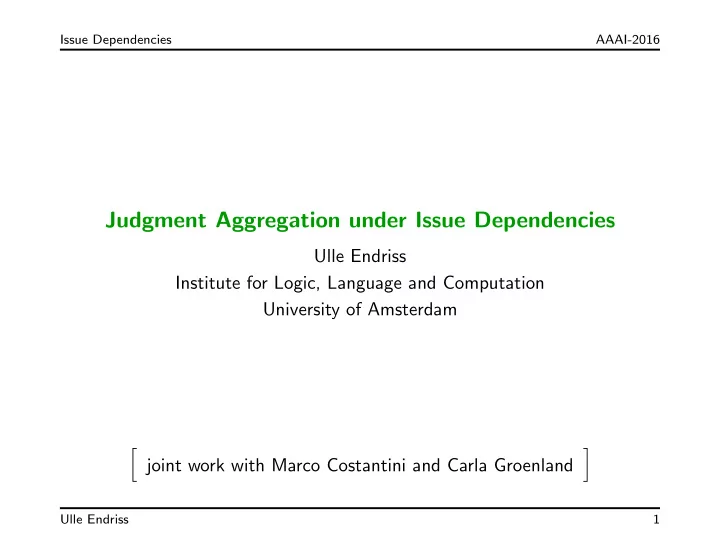

Issue Dependencies AAAI-2016 Judgment Aggregation under Issue Dependencies Ulle Endriss Institute for Logic, Language and Computation University of Amsterdam � � joint work with Marco Costantini and Carla Groenland Ulle Endriss 1
Issue Dependencies AAAI-2016 Example: Choosing a Common Meal for a Party A group of 23 gastro-entertainment professionals need to decide on the meal (1 dish + 1 drink) to be served at a party. What to choose? Chips? Beer? Caviar? Champagne? 11 individuals: Yes Yes No No 10 individuals: No No Yes Yes 2 individuals: No Yes Yes No Integrity Constraint: ( Chips xor Caviar ) ∧ ( Beer xor Champagne ) Ulle Endriss 2
Issue Dependencies AAAI-2016 Talk Outline • Binomial Rules: Issue Dependencies in Judgment Aggregation • Theoretical Analysis: Axiomatics and Computational Complexity • Experimental Analysis: Aggregating Hotel Reviews Ulle Endriss 3
Issue Dependencies AAAI-2016 Binomial Rules for Judgment Aggregation Each agent accepts/rejects each issue (only some ballots are rational ). An aggregation rule needs to map each profile to a consensus. Idea: Award 1 point to potential outcome B ⋆ for every ballot B i and issue set I with | I | ∈ K such that B i and B ⋆ fully agree on I . � Agr( B, B ⋆ ) � � � F K : B �→ argmax k B ⋆ rational B ∈ B k ∈ K Most general definition also includes a weight function w : K → R + . Interesting special cases: K = { k } (in which case w is irrelevant). Note: this is Kemeny rule for k = 1 and plurality-voter rule for k = m . Ulle Endriss 4
Issue Dependencies AAAI-2016 Theoretical Results Nice axiomatic properties (but full characterisation is open): Theorem 1 Binomial rules are amongst the very few rules discussed in the literature that satisfy both collective rationality and reinforcement: F ( B ) ∩ F ( B ′ ) � = ∅ implies F ( B ⊕ B ′ ) = F ( B ) ∩ F ( B ′ ) Binomial rules cover the range from the trivial to the highly intractable: Theorem 2 Winner determination for F { k } is in P if ( m − k ) ∈ O (1) . Theorem 3 But the same problem is P NP [log] -complete if k ∈ O (1) . Ulle Endriss 5
Issue Dependencies AAAI-2016 Experiment: Aggregating Hotel Reviews Ratings for 6 features ( location , etc.) of 1850 hotels from TripAdvisor. Translation of 1–5 star scale: accept (4–5) or reject (1–3). Results for the full data set not that interesting (see paper). But . . . Ulle Endriss 6
Issue Dependencies AAAI-2016 Polarisation in Judgment Aggregation In the paper, we develop a formal measure of polarisation of a profile, defined as the product of a correlation and an uncertainty coefficient: • correlation = average strength of dependencies between issue pairs • uncertainty = average disagreement on individual issues A subset of 31 profiles (opinions on 31 hotels) are “ highly polarised ”. Ulle Endriss 7
Issue Dependencies AAAI-2016 The Compliant Reviewer Problem What makes for a good meta review (the result of the aggregation)? You are writing a hotel review for an online magazine and you want to please as many of your readers as possible (to maximise the number of like’s received). Suppose a reader will like your review if she agrees with you on � k issues. We will use this compliant-reviewer score to evaluate our results. Ulle Endriss 8
Issue Dependencies AAAI-2016 Results for Highly Polarised Profiles Comparing two instances of our family of rules with the majority rule. Ulle Endriss 9
Issue Dependencies AAAI-2016 Last Slide Proposal for a new family of judgment aggregation rules: • Attempt to account for hidden dependencies between issues • Score agreement of outcome with ballots on subsets of issues • Parameters: subset sizes to consider + weight function Initial results for these so-called binomial rules: • Includes spectrum of rules from Kemeny to plurality-voter rule • Complexity: winner determination ranges from P to P NP [log] • Axiomatics: both collective rationality and reinforcement ok • Experiments: good performance for highly polarised hotel reviews New concepts of potentially independent interest: • Notion of polarisation of a profile in judgment aggregation • Compliant Reviewer Problem to evaluate aggregation rules Ulle Endriss 10
Recommend
More recommend